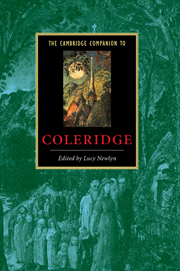7 - The talker
from Part II - Discursive modes
Published online by Cambridge University Press: 28 May 2006
Summary
S.T. Coleridge Ætat. Suae 63.
Not / handsome / was / but was / eloquent
Coleridge.Dorothy Wordsworth would have concurred: 'At first I thought him very plain, that is, for about three minutes: he is pale, thin, has a wide mouth, thick lips, and not very good teeth, longish, loose-growing, half-curling, rough, black hair . . . But, if you hear him speak for five minutes you think no more of them' (IR, 45). Dorothy's account is exceptional in its humane amusement; but the extraordinary effect she attributes to Coleridge's speech is quite usual. Leigh Hunt recalled Byron leaving Coleridge's company, 'saying how wonderfully he talked', and added: 'This is the impression of every body who hears him' (IR, 219). In what Hazlitt acerbically characterised as 'an age of talkers' (CT, 255), Coleridge became famous as the greatest of them all. Tourists on the culture-trail, in Highgate years especially, would approach him, a great curiosity, expecting an extraordinary exhibition (which they normally received). He seems to have quietly delighted in the facility, and the celebrity it won him; and, perhaps, to have relied too much upon his power to charm: 'I have heard him say', recollected a fellow traveller in Germany, 'fixing his prominent eyes upon himself (as he was wont to do, whenever there was a mirror in the room), with a singularly coxcomical expression of countenance, that his dress was sure to be lost sight of the moment he began to talk; an assertion which, whatever may be thought of its modesty, was not without truth' (IR, 74). Occasionally, he wearied of the duty to perform, which he could find exhausting: 'He deemed Himself obliged to Play first Violin', wrote a bemused and bored Lady Jerningham after a visit, 'and was much fatigued with the violent exertion He made' (IR, 134). Visitors in his last years were sometimes warned not to draw him into too exciting a conversation, as the sheer physical demands of discoursing struck Dr and Mrs Gillman, his protective hosts, as seriously life-threatening.
- Type
- Chapter
- Information
- The Cambridge Companion to Coleridge , pp. 103 - 125Publisher: Cambridge University PressPrint publication year: 2002
- 8
- Cited by



